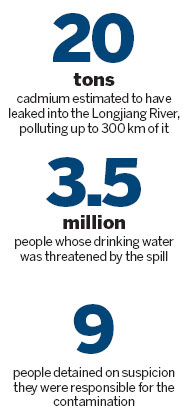Clear need to answer questions after pollution
Updated: 2012-02-07 09:54
By Qiu Bo and Li Jing (China Daily)
|
||||||||
Is it safe?
|
|
Huang Chaoxin said that in front of his home, the Longjiang is showing black mixed with the yellow mud of the river, which happens every December. "The turbid color in water normally lasts for two months."
Local government has said the water near Lalang station, where Huang lives, is clear of the heavy-metal poison, but all the sediment in the water concerns him. "We know our tap water is from the turbid river, but there's nothing we can do."
Meanwhile, farmer Xie Linjun, 27, who lives nearby, said his crops along the riverbank are growing normally. "We cannot go fishing in our spare time as we did in normal years, but the crops are not affected" by the tainted river.
Lack of transparency
The Longjiang cadmium spill is yet another in a string of major heavy-metal pollution incidents.
Statistics from the Ministry of Environmental Protection show there have been more than 30 serious cases of heavy metal pollution by chemical, photovoltaic, pharmaceutical and IT companies in about 10 provinces since 2009.
In early 2011, the ministry released a five-year blueprint to target heavy-metal pollution, including by arsenic, lead, mercury, chromium and cadmium. But details of the blueprint have not been published.
Environmentalists say that without making pollution information available to the public, the effectiveness of pollution control efforts can only be limited.
"The environmental ministry had called for a 'blanket inspection' of heavy metal pollution facilities. This means, in theory, local governments should already have an inventory of local industrial facilities that release heavy metals, with basic information on who is discharging what," said Ma Tianjie, toxic campaign head with Greenpeace East Asia.
"With such information in hand, a local government should be able to quickly pinpoint a source of pollution when it sees an unusual increase in the monitoring data of certain pollutants. This apparently did not happen in the case in Guangxi," he said.
Ma Jun, director of the Beijing-based Institute of Public and Environmental Affairs, said the incident should be a wakeup call for Hechi city, which is benefiting from its booming mining and smelting industries.
Write the reporters at qiubo@chinadaily.com.cn and lij@chinadaily.com.cn.

 Relief reaches isolated village
Relief reaches isolated village
 Rainfall poses new threats to quake-hit region
Rainfall poses new threats to quake-hit region
 Funerals begin for Boston bombing victims
Funerals begin for Boston bombing victims
 Quake takeaway from China's Air Force
Quake takeaway from China's Air Force
 Obama celebrates young inventors at science fair
Obama celebrates young inventors at science fair
 Earth Day marked around the world
Earth Day marked around the world
 Volunteer team helping students find sense of normalcy
Volunteer team helping students find sense of normalcy
 Ethnic groups quick to join rescue efforts
Ethnic groups quick to join rescue efforts
Most Viewed
Editor's Picks

|

|

|

|

|

|
Today's Top News
Health new priority for quake zone
Xi meets US top military officer
Japan's boats driven out of Diaoyu
China mulls online shopping legislation
Bird flu death toll rises to 22
Putin appoints new ambassador to China
Japanese ships blocked from Diaoyu Islands
Inspired by Guan, more Chinese pick up golf
US Weekly

|

|







